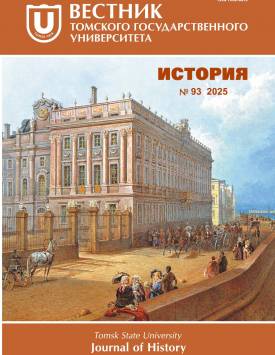Institutional transformations and cognitive changes of residents of Luhansk region at the turn of the XX–XXI centuries
The article analyzes the genesis of political institutions in the Luhansk region at the end of the XX - beginning of the XXI centuries on the basis of data from domestic sources, and identifies the prisms, goals, tasks, methods of the local elite to form cultural constants, as well as the political behavior of residents of the Luhansk region. The aim of the study is to create a holistic picture of its development in 1990-2020, taking into account the definition of the stages of formation of the political institutions of the LPR and its influence on the political behavior of local elites and active citizens of the Luhansk region. Within the framework of the article, the following tasks are supposed to be solved in order to achieve the goal: 1) to analyze the transformations of the political institutions of the Luhansk region; 2) to determine the influence of the political elite of Ukraine on the political behavior of Lugansk voters. 3) to determine the influence of the Church in the process of shaping the political behavior of residents on the territory of Ukraine. The subject of the study is the problems of the genesis and evolution of the political behavior of the Luhansk region in 1990-2024 as a set of cultural and ideological values of local elites and residents of the region, as well as as a way of political communication and expression of political will. Thus, the study of the political behavior of the inhabitants of Luhansk region involves comparing the orientations of social groups to specific political objects, the orientations of individual groups to various objects, as well as models of orientations and behaviors. From a methodological point of view, all empirical political research is comparative, so we should expect to face the problem of comparability of political data, and in particular, the problem of equivalence of averages, in all areas of political research. When comparing cultural data from different countries, the requirements of equivalence of meaning are probably more difficult to fulfill than in any other field. From a methodological point of view, all empirical political research is comparative, so we should expect to face the problem of comparability of political data, and in particular, the problem of equivalence of averages, in all areas of political research. When comparing cultural data from different countries, the requirements of equivalence of meaning are probably more difficult to fulfill than in any other field. Conclusions: the study of the genesis and evolution of Luhansk political culture (1990-2024) makes it possible to identify the main trends, processes, patterns that determined the development of Luhansk region, makes it possible to imagine and understand the unique phenomenon of Luhansk political culture and the political behavior of Luhansk residents in a new way. The authors declare no conflicts of interests.
Keywords
political culture, values, evolution of the political culture of Luhansk region, political institutions of Luhansk region, political behavior of voters, Luhansk regionAuthors
| Name | Organization | |
| Belokonev Sergey Yu. | State University of Management; Financial University under the Government of the Russian Federation | SYUBelokonev@fa.ru |
| Griva Ivan P. | Tomsk State University; Lugansk State University named after Vladimir Dahl | Hryvaivan19@mail.ru |
References

Institutional transformations and cognitive changes of residents of Luhansk region at the turn of the XX–XXI centuries | Tomsk State University Journal of History. 2025. № 93. DOI: 10.17223/19988613/93/3
